Key takeaways:
- Emotional intelligence (EI) includes self-awareness, self-regulation, social awareness, and relationship management, crucial for effective communication and empathy in political discourse.
- Practicing EI can transform heated discussions into constructive dialogues by acknowledging and validating emotions, fostering connection and mutual understanding.
- Sharing personal stories and emotions in political contexts often resonates with audiences, enhancing trust and engagement in the political process.
- Challenges in applying EI include confronting personal biases, misinterpreting emotions, and balancing empathy with assertiveness in discussions.
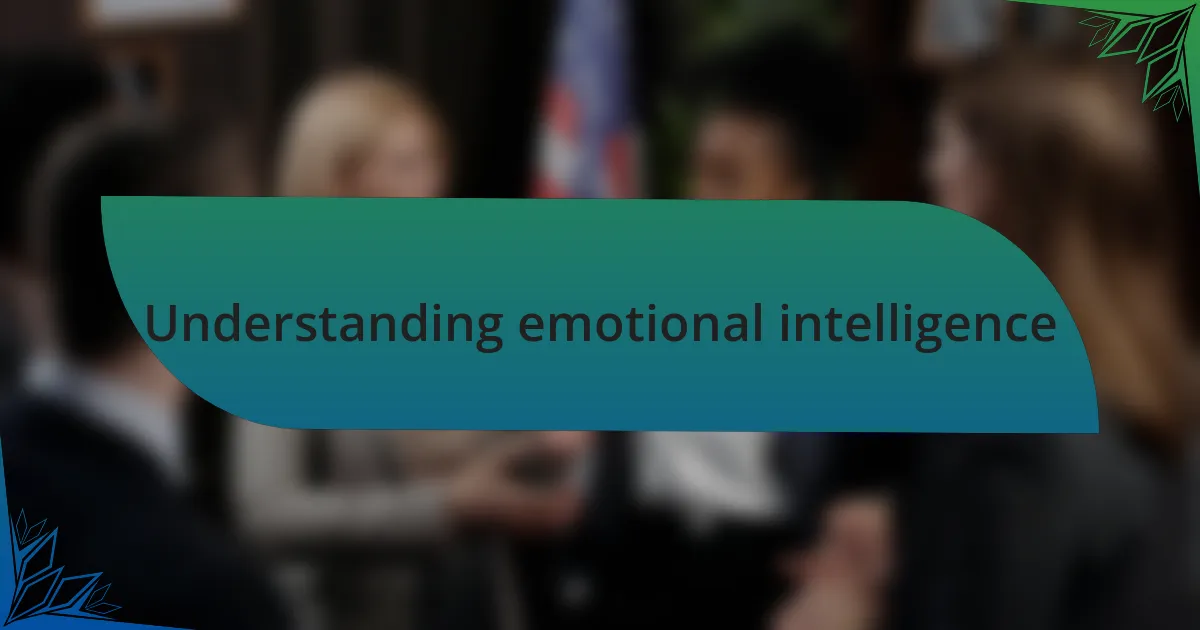
Understanding emotional intelligence
Emotional intelligence, often abbreviated as EI, involves the ability to recognize, understand, and manage our own emotions while also being sensitive to the emotions of others. I remember a particularly intense political debate I watched; the candidates were skilled at attacking each other’s points but had little regard for the emotional atmosphere in the room. It struck me then how crucial emotional intelligence is in politics—it’s about reading the room as much as it is about articulating policy.
As I delved deeper into EI, I realized that it comprises four key components: self-awareness, self-regulation, social awareness, and relationship management. Reflecting on my own experiences, I can say that self-awareness has been a game changer for me. There have been moments when I felt overwhelmed by strong emotions during discussions, but understanding my feelings helped me remain composed and contribute constructively instead of reacting impulsively.
Have you ever found yourself in a heated conversation where emotions ran high? In those moments, social awareness can make all the difference. I’ve often tried to gauge the underlying emotions of those around me, and this awareness sometimes shifts the dynamic entirely. Recognizing when someone feels anxious or defensive enables a more empathetic approach, often leading to more productive discussions, especially in politically charged environments.
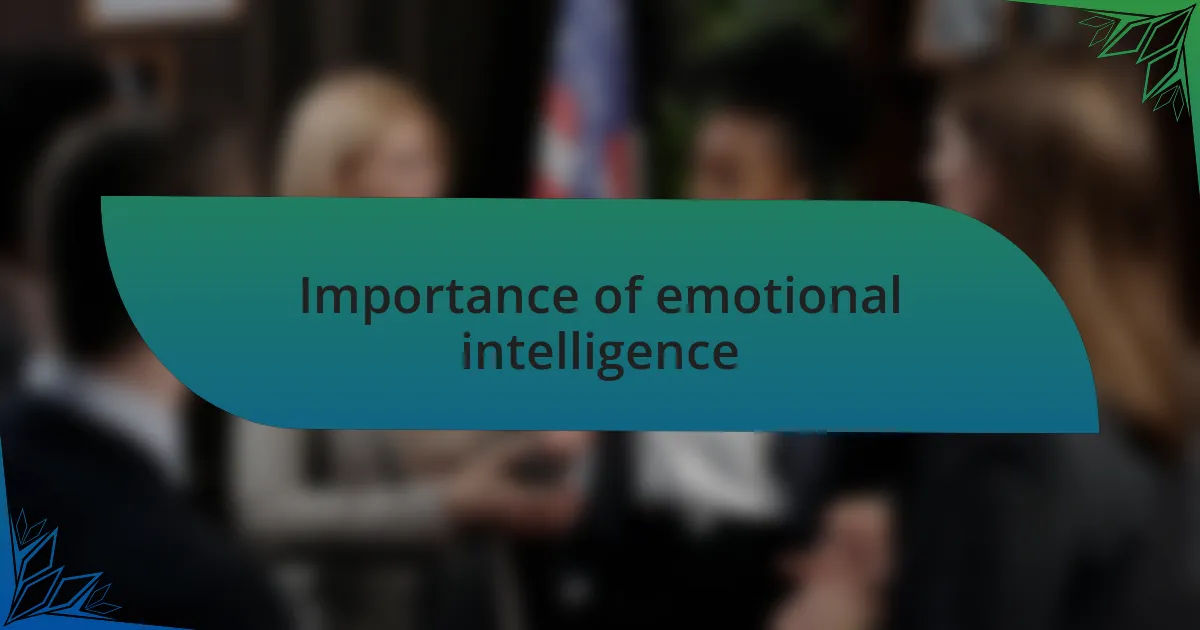
Importance of emotional intelligence
Emotional intelligence is essential in fostering meaningful relationships and effective communication, especially in the political arena. I remember a town hall meeting where a candidate genuinely listened to the audience’s concerns, acknowledging their frustrations rather than just pushing a political agenda. This responsiveness can create a sense of connection, and it made me wonder: how often do we engage with one another by truly understanding feelings before presenting our viewpoints?
Being aware of our emotions helps us navigate conflicts with grace. For instance, during a contentious discussion among friends about policy choices, I felt my blood pressure rising, but taking a moment to breathe and collect my thoughts allowed me to approach the topic with a level head. In situations where tempers can flare, emotional intelligence provides the necessary tools to remain calm and guide the conversation toward mutual understanding rather than hostility.
In a world where political polarization is increasingly common, the importance of emotional intelligence cannot be overstated. Have you ever noticed how a tactful response can diffuse tension? I’ve observed that the most effective leaders don’t just state their views; they articulate them in a way that resonates with others’ feelings, which can lead to productive dialogues. Harnessing emotional intelligence can not only enhance individual perspectives but also help foster a more compassionate political landscape.
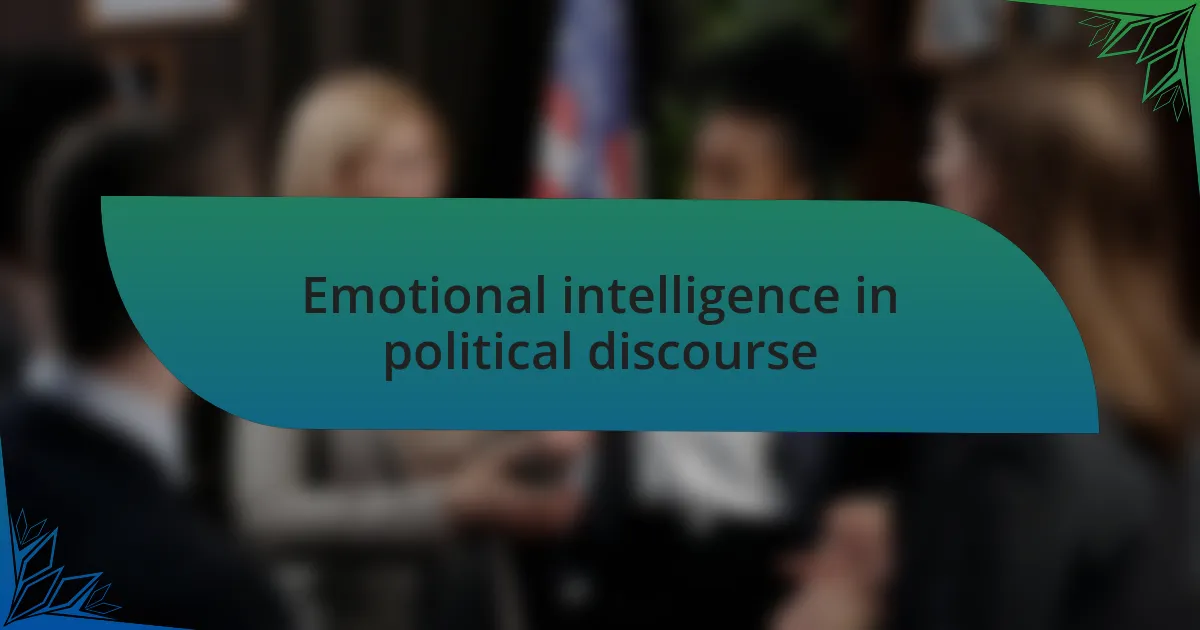
Emotional intelligence in political discourse
Effective emotional intelligence in political discourse can dramatically shift the dynamics of communication. I recall a debate where one candidate acknowledged the emotional weight behind a controversial topic, effectively validating the audience’s feelings. This approach not only softened the atmosphere but also encouraged others to express their views openly, demonstrating that empathy can bridge gaps in understanding.
In my experience, I’ve seen how leaders who actively practice emotional intelligence can transform heated discussions into constructive dialogue. During a community panel, I noticed how one speaker took time to reflect back the emotions he heard in the crowd. This simple act of validation not only diffused tension but also created an environment where differing perspectives could coexist. Isn’t it fascinating how taking a moment to acknowledge feelings can open pathways to compromise?
Moreover, I often ponder the impact of emotional intelligence on public perception. When politicians share personal stories or express vulnerability, it often resonates deeply with constituents. I remember during an election season when a candidate openly discussed their struggles, and the audience responded with unexpected warmth. It made me question: couldn’t our leaders’ willingness to connect on an emotional level inspire greater trust and engagement in the political process?
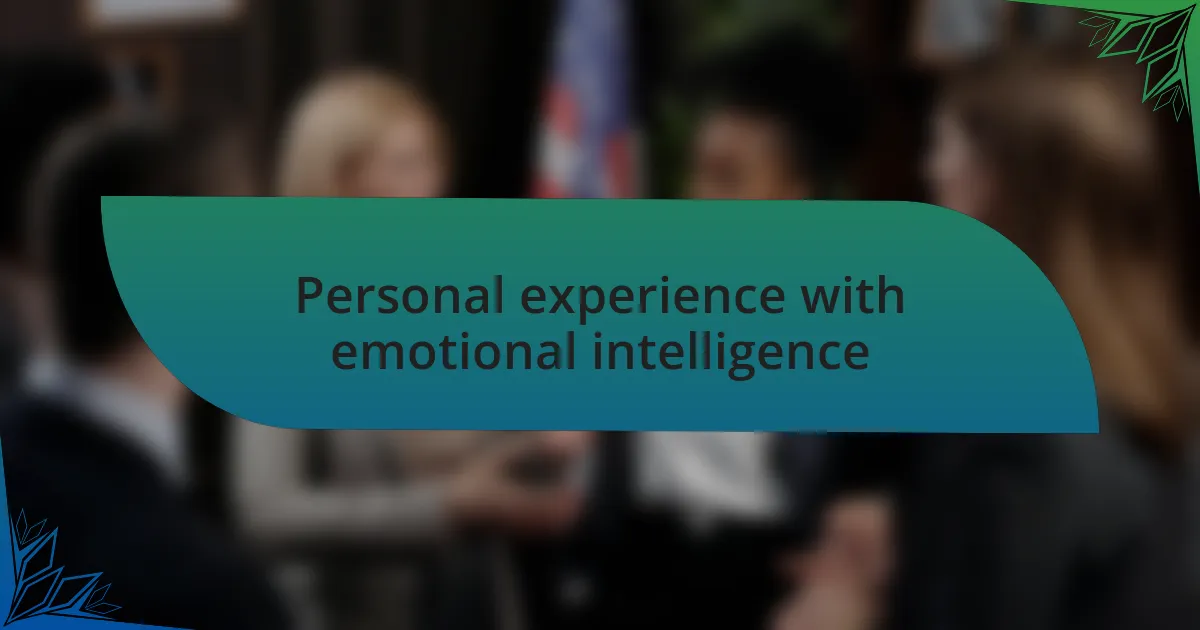
Personal experience with emotional intelligence
There was a time when I was part of a focus group discussing a local policy change. I noticed how the group reacted when one participant shared a heartfelt story about how the change would impact their family. Suddenly, the room shifted; the mood went from skepticism to empathy. It struck me how a single narrative could transform facts into feelings, making us all more receptive to diverse opinions.
I also remember a town hall meeting where a politician paused before responding to a heated question. Instead of diving into policy details, they acknowledged the emotional weight of the concerns raised. I felt this intentional moment of reflection shifted the focus from debate to shared humanity. It made me wonder: how often do we prioritize understanding feelings over arguing points in discussions that really matter?
Reflecting on these experiences, I’ve come to appreciate the subtle power of emotional intelligence in shaping our interactions. During discussions, I’ve tried to adopt this mindful approach myself, aiming to validate the feelings of others before sharing my views. It fosters a more inclusive dialogue and challenges me to listen deeper. Isn’t it amazing how connecting on an emotional level can enrich our conversations, both in politics and beyond?
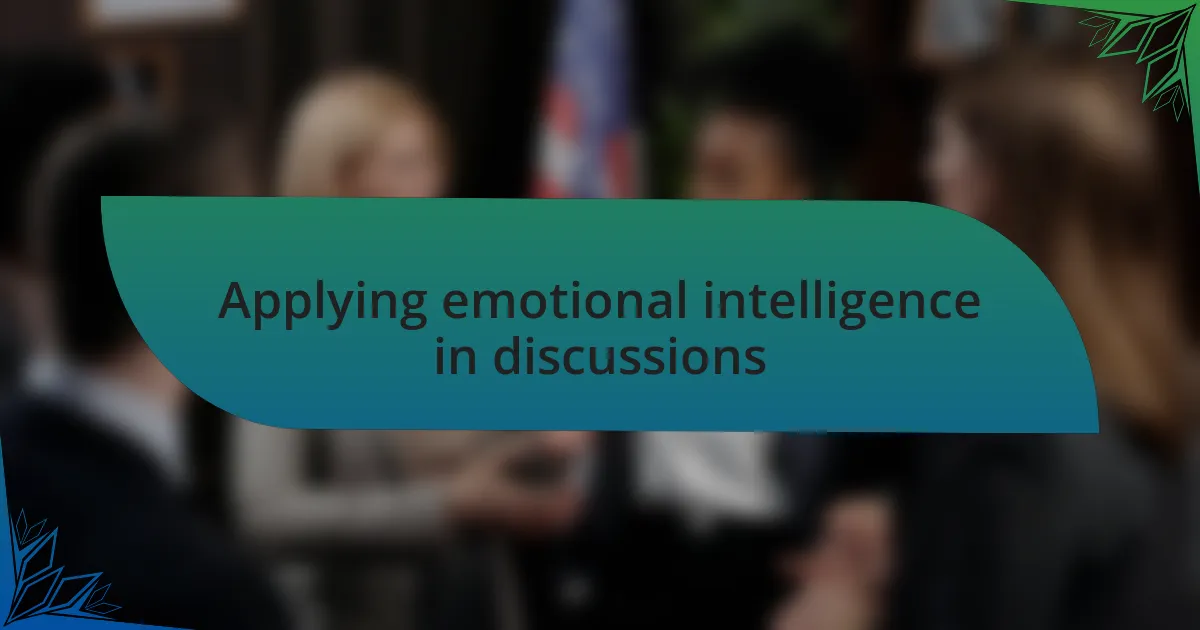
Applying emotional intelligence in discussions
In my experience, applying emotional intelligence during discussions often means being fully present and attuned to the emotions in the room. Once, while debating an important issue with friends, I noticed rising tensions when certain points were made. I took a moment to address the underlying feelings, asking everyone to express what was at stake for them personally. This shift turned a potentially divisive conversation into a productive exchange of values and beliefs.
Another time, during a community forum about climate change, I observed how a small team of activists skillly intertwined facts with the emotional narratives of affected individuals. They didn’t just present statistics; they shared stories that drew upon fear for the future and hope for young generations. I couldn’t help but reflect on how powerful it can be to weave emotional insights into factual discussions. How often do we overlook the deep-seated feelings that drive our opinions?
I’ve found that acknowledging emotions in discussions allows for more authentic connections. Recently, after a vigorous debate on education policy, I chose to wrap up my points with a personal story about my own educational journey. This moment not only diffused the tension but also opened the floor for others to share their experiences, creating a richer dialogue. Isn’t it fascinating how our vulnerabilities can create pathways for understanding and collaboration in politically charged conversations?
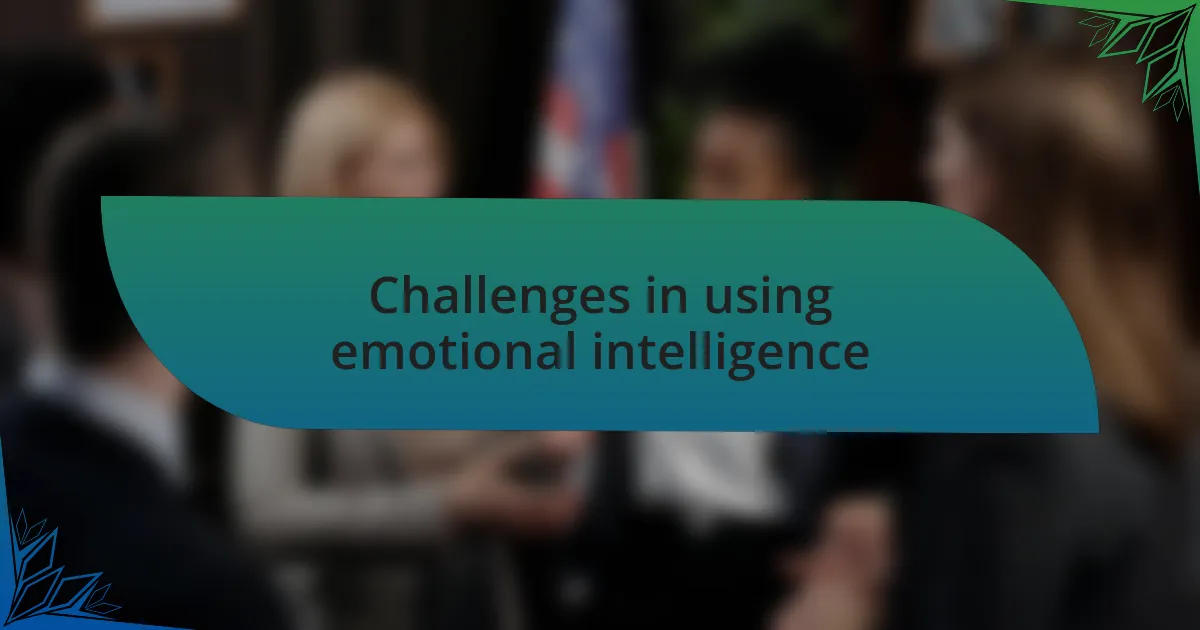
Challenges in using emotional intelligence
Navigating the challenges of emotional intelligence often involves confronting my own biases and discomfort. I recall a heated discussion on social justice where my initial reaction was defensive. Instead of engaging with the emotions of others, I found myself focusing too much on defending my standpoint. Recognizing this tendency was crucial; it was a stark reminder that emotional intelligence isn’t just about reading others but also about self-awareness and regulating my responses.
Another difficulty I’ve encountered is the risk of misinterpreting others’ emotions. There was an instance during a town hall meeting when I perceived frustration from a stakeholder, prompting me to address it. However, I later learned that their emotions stemmed from exhaustion rather than anger. I realized then that jumping to conclusions about someone’s feelings can sometimes lead to miscommunication. How often do we assume we understand the emotional landscape before fully exploring it?
Finally, there’s the challenge of balancing empathy with assertiveness. In political dialogues, I sometimes find it difficult to advocate for a position while still being sensitive to opposing viewpoints. I remember a policy debate where I tried to strike this balance but felt torn. How do we honor our convictions while also validating the emotions of those who disagree? This duality is a constant learning experience, reminding me that emotional intelligence requires ongoing practice and reflection.